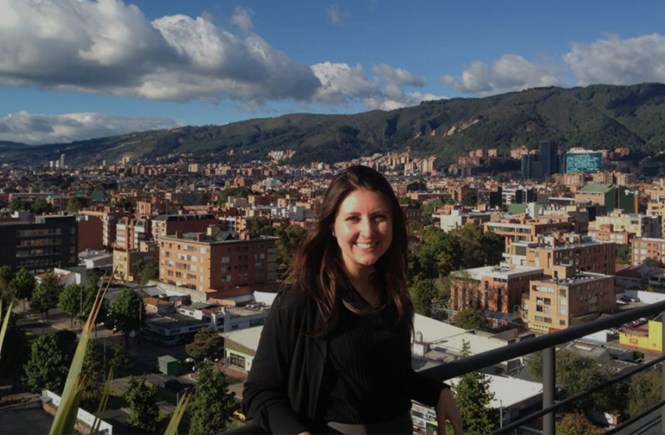This week, we chat with Zoe Björnson, a California native who has called New York, Copenhagen, and New Orleans home!
Page Contents
- 1 Hey Zoe, tell us more about your background.
- 2 How long have you been a digital nomad?
- 3 Tell us more about being a part of Remote Year!
- 4 What are your top 3 memories from Remote Year?
- 5 Any cons of being a part of Remote Year?
- 6 If you had to pick one city, which city would be your favorite city as a digital nomad?
- 7 We said one city! Hah. What about life as a digital nomad… what’s the hardest part?
- 8 What’s one productivity tip you’ll recommend?
- 9 Have you encountered any safety issues while traveling?
- 10 Lastly, your tips for those thinking of becoming a digital nomad.
- 11 Love this post? Share it on Pinterest!
Hey Zoe, tell us more about your background.
I studied communication and French at Tulane University in New Orleans and I currently do product management and marketing for San Francisco-based startup called about.me. We help people create simple, beautiful one page websites with a purpose. Before joining the product team, I worked on marketing and college outreach for the company. I have experience in social media, marketing, and content strategy.
How long have you been a digital nomad?
I’ve been a traveler for as long as I can remember. I have been fortunate enough to have traveled a lot when I was younger. My parents put travel as a priority when I was growing up and I spent a lot of time in France, doing the whole ‘slow travel’ thing, as a kid. I went on to study abroad during college in Copenhagen and totally fell in love with all of Europe. In my time abroad, I realized that I felt so much more myself when traveling, or even just in a foreign country. I’m mildly convinced I was born on the wrong continent. Sorry, America.
In terms of digital nomad-ism, I sort of fell into it. During college, I spent a lot of time working from my bed (let’s not embellish #workingfromhome) on side projects and online internships. I wrote for online publications and made a lot of connections with people I had never met IRL. While I didn’t know it at the time, I was working remotely.
Once I started my job at about.me, I wasn’t necessarily expected to stay in San Francisco. So I started exploring parts of the States, figuring out where I wanted to plant myself. That turned into a very indecisive year or so of me staying with friends, living at home with parents, or just subletting in new cities for short chunks of time. And then along came Remote Year.
I was living in New York when a lease on an apartment in Brooklyn fell through, so I was thinking about living in Hawaii, Denver, and Austin for a month or so at a time, kicking off that nomad lifestyle, but then Remote Year opened up their applications. I sent mine in immediately. It was definitely “right place at the right time” kind of situation. I was accepted a few weeks later. Now here we are!
Tell us more about being a part of Remote Year!
The community of Remote Year is really what has made it all worth it for me. It was what I was most looking forward to, as I was previously working from home in small New York City apartments, barely talking to anyone on any given day or just working at my parents’ dining room table. Fun fact: Working from home gets lonely.
I’ve met some truly amazing people on this journey, both on the program and the people, locals and travelers, we meet in each city. All of the people on Remote Year are the good kind of crazy — they agreed to go on a trip around the world for a year with 70 strangers, for Christ’s sake! They are all excited to be where they are and that’s something rare in this world, I think. They are the kind of people who I am not sure how I would have met without Remote Year. Some of my closest friends are over ten years older than I am, and I think that’s a really unique aspect of the program.
What are your top 3 memories from Remote Year?
My top three memories from the program have been:
- Spending the day on a farm outside of Córdoba, Argentina playing with animals, riding horses, swimming, having an asado (Argentinian BBQ), and making new friends.
- Finishing a sushi dinner with a surprise and being lead into a speakeasy behind the restaurant. Lots of squealing ensued.
- Dancing. My Cousteaus (our Remote Year nickname) have moves. Anytime we have a party in one of our cities, it’s a good time.
Any cons of being a part of Remote Year?
One of the cons I’ve seen get more apparent as we get further along in the program, is that we’re kind of like a little bubble because we all are so close. I’m sure each person and each Remote Year program has their different vibe, but I love these people so much that I want to enjoy my time with them (because it does end, unfortunately), so I can see us sort of being a little cliquey from time to time, and not branching out in our local communities as much as we probably should have. What what’s nice about this realization, is that there’s time to fix it.
If you had to pick one city, which city would be your favorite city as a digital nomad?
Well, I’m gonna pick two. So far, I’ve really loved Buenos Aires and Prague. They are both cities that have a good level of city life, livability, culture (food, music, etc.), and affordability. I’m only a few days into Prague and already love it and see myself coming back, but I know that Buenos Aires is a city that I’d love to return. I felt like the month I spent there wasn’t quite enough and I need more!
We said one city! Hah. What about life as a digital nomad… what’s the hardest part?
Saying no.
I mean this in the broadest sense - it could mean saying no to yourself, to your friends, or to your employer. For example, I am not a creature of habit, so developing a routine is really hard for me. For example, I know that I’m more productive in the morning; however, I like to sleep in. Sometimes I just need to tell myself ‘no, you can’t snooze your alarm for two hours this morning. You have to wake up.’ Which is hard when you don’t have the requirement of catching a 7:30AM train to work.
What’s one productivity tip you’ll recommend?
I can’t say I use it all the time (see above answer on not being a creature of habit), but I am a big fan of the Pomodoro Technique. The Pomodoro Technique is a time management tool that teaches you to work with time, not against it. With the Pomodoro technique, you work in chunks of time, finishing tasks, and then taking a short break. It helps eliminate burnout, and for me, I find it to be a nice little fence for my brain by focusing on one task at a time and finishing it.
Have you encountered any safety issues while traveling?
I haven’t had any safety issues on Remote Year, but sometimes being a single woman in any city gets a little nerve wracking. I’ve had some issues in the past, but I make a point to always be aware, try not to walk alone at night, and live by my mother’s favorite rule - “Don’t be dumb.”
Lastly, your tips for those thinking of becoming a digital nomad.
Know yourself.
Being a digital nomad isn’t for everyone. It’s not all fun — you don’t just travel constantly and take pretty pictures (like one might assume from my Instagram feed). It’s hard work staying focused on work, budgeting, meeting new people every time you move, and so on and so forth. This is an awesome lifestyle if it fits you, but if it doesn’t, it doesn’t! You have to know how you work and function. My advice would be to do some testing of this digital nomad life. Live in a new city for 2-4 weeks, and see how it goes. Don’t dive in feet first, because it might be a little hard to turn back.
Follow Zoe on about.me, Medium, Instagram, Twitter.


